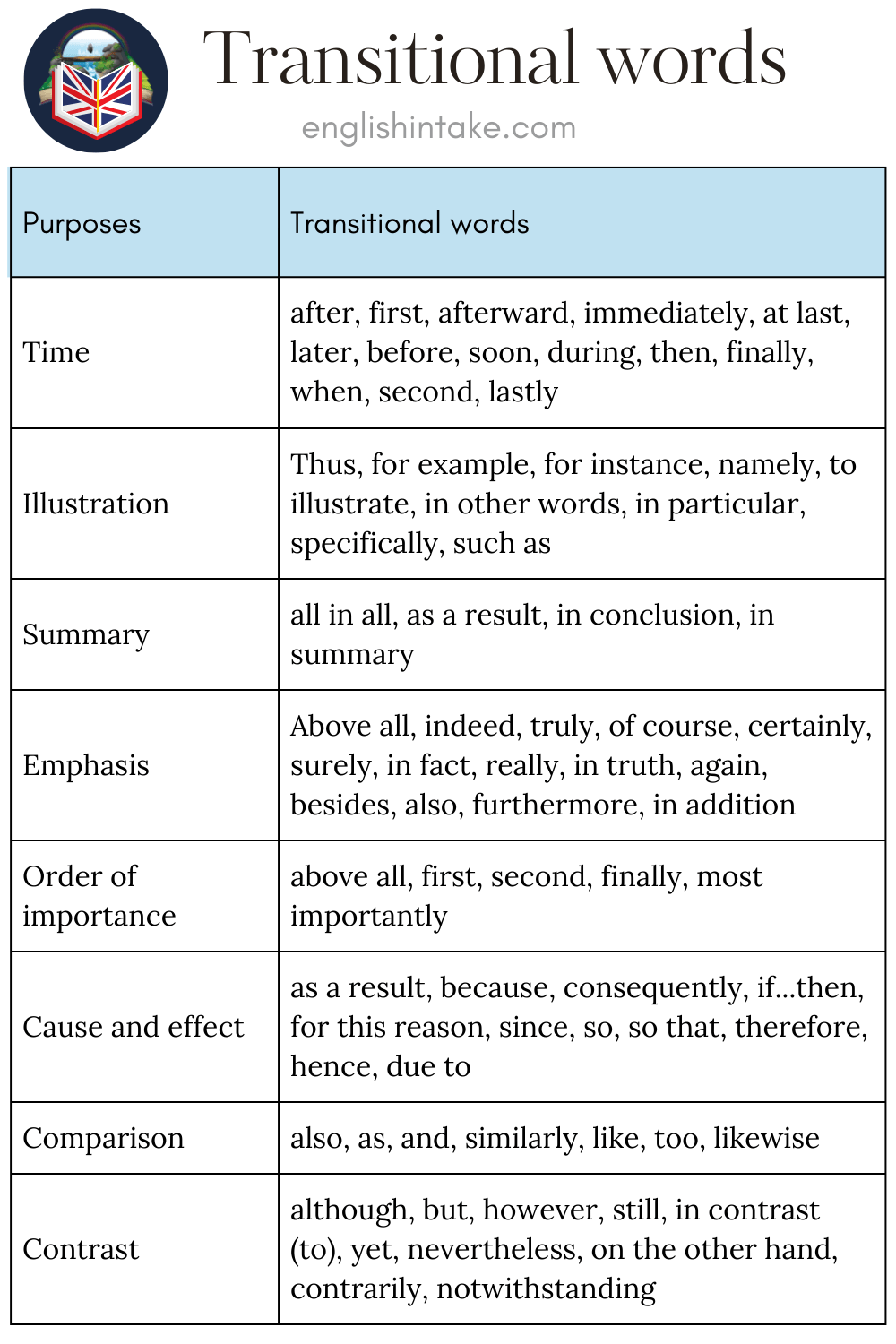1. What are linking words?
Linking words, also known as connectors or transition words, are words that help make connections between ideas or sentences. Understanding how to use them is crucial to make our sentences easy to follow.
In English, there are various phrases you can use to improve your writing flow. We will look at each of them in detail using practical examples.
2. List of linking words
2.1 Consequence
Used to show that something is the result of a particular action or situation
He didn't study for the exam. As a consequence, he failed.
Used to introduce the consequence of something previously mentioned
It rained heavily all night. As a result, the roads were flooded.
As a result; therefore
She worked hard all year. Consequently, she received a promotion.
For this reason; therefore
The product was defective, hence the refund.
For that reason; consequently
He was late to work three times this week. Therefore, his boss gave him a warning.
As a result or consequence of this; therefore
The company lost money for three consecutive quarters, thus leading to layoffs.
Used to show the result or effect of something
I was tired, so I went to bed early.
2.2 Contrast
Despite the fact that; even though
Although it was raining, we went for a walk.
Used to introduce something contrasting with what has already been mentioned
I wanted to go to the party, but I was too tired.
Without being affected by; in spite of
Despite the bad weather, the event was a success.
Used to introduce a statement that contrasts with something that has just been said
The task was difficult. However, we managed to complete it on time.
Used to show how two things are different from each other
The north is cold and snowy. In contrast, the south is warm and sunny.
Used to show that the opposite of what has been suggested is true
I don't dislike the idea. On the contrary, I think it's excellent.
In spite of that; however
The project was challenging. Nevertheless, the team completed it successfully.
Used to compare or contrast two facts
Some people like coffee, whereas others prefer tea.
2.3 Addition
As an extra fact or thing; also
The hotel has a gym. Additionally, it has a swimming pool.
In addition; too
She plays the piano. She can also play the guitar.
In addition to what has already been said
The product is affordable. Furthermore, it comes with a two-year warranty.
Used to add information that supports or emphasizes what you are saying
The restaurant has excellent food. Moreover, the service is outstanding.
With the addition of; and also
The job offers a good salary, plus health benefits.
As well as; also
We need more staff. In addition, we need better equipment.
Used to add a more important or surprising piece of information
The car is fast and reliable. What's more, it's fuel-efficient.
In addition to; as well as
I don't want to go out tonight. Besides, I have work to do.
Used to connect words, phrases, or clauses
She bought apples and oranges at the market.
2.4 Time
Following in time; later than
After dinner, we went for a walk.
During the period of time preceding a particular event
Please wash your hands before eating.
Throughout the course or duration of a period of time
We stayed indoors during the storm.
At the same time; in the intervening period
I'll prepare dinner. Meanwhile, you can set the table.
After a particular thing has happened; afterwards
He graduated in 2020 and subsequently found a job in marketing.
Up to the point in time or the event mentioned
Wait here until I come back.
At the moment that; immediately after
As soon as I arrived, the meeting started.
As soon as; when
Once you finish your homework, you can watch TV.
2.5 Example
Used to introduce something that illustrates what you are talking about
There are many ways to stay healthy. For example, you can exercise regularly.
Used to introduce a specific example of something you are talking about
Some fruits are rich in vitamin C. For instance, oranges and strawberries.
Used to introduce more exact and detailed information
Only one person can do this job, namely you.
Used to introduce examples of something you are talking about
I enjoy outdoor activities such as hiking and cycling.
2.6 Summary
Used to introduce the final comments at the end of a speech or piece of writing
In conclusion, I believe this proposal will benefit everyone.
Used to introduce a short statement of the main points
In summary, the project was successful and completed on time.
Used to introduce a final summary of what has been said or written
To sum up, we need to focus on customer satisfaction and quality.
Taking everything into account; in general
Overall, the performance was excellent despite a few minor issues.
In a few words; briefly
In brief, the company plans to expand into new markets next year.
2.7 Cause
For the reason that; since
We stayed inside because of the heavy rain.
Caused by or resulting from
The flight was delayed due to bad weather.
Because; as
Since it's your birthday, let's go out for dinner.
Because; since
As I was tired, I decided to go to bed early.
2.8 Comparison
In a similar way; likewise
John loves basketball. Similarly, his brother enjoys playing football.
In the same way; also
She enjoys reading. Her sister, likewise, loves books.
Similarly; in a comparable manner
Students must work hard. In the same way, teachers must be dedicated.
Used to show the similarities or differences between two things
This phone is cheap compared to the latest model.
Similar in size, amount, or quality
Their performance is comparable to last year's results.
Identical to; not different from
My opinion is the same as yours.
Used to compare things that are equal in some way
She is as tall as her sister.
Similar to; in the same way as
He runs like a professional athlete.
3. Different types of linking words
There are many types of linking or transition words in English. Let's look at them one by one.
3.1 Consequence
To show the result or outcome of a situation, we can use consequently, as a result, hence, therefore, and thus. They help connect two parts of a sentence or two sentences to clarify that what is stated in the second part is a direct result of what is mentioned in the first part.
1. Air quality in the city has deteriorated as a consequence of increased traffic congestion.
2. His dad just passed away, hence his sadness.
3. She forgot to set his alarm; therefore, he was late for the meeting.
4. The teacher was sick; consequently, the class was cancelled.
5. Thousands of protesters gathered on main street last Saturday. As a result, the road was blocked for hours.
6. He forgot to set his alarm and thus missed his flight.
7. It was too hot, so we stayed indoors.
3.2 Contrast
To express how different things are, we can use but, however, on the other hand, in contrast, and although. They connect ideas or sentences to introduce that something is different from what was said before.
1. She bought the expensive dress, although she was trying to save money.
2. She managed to finish the marathon despite her injury.
3. The team worked hard; however, they lost the game.
4. Summer days are long and sunny; in contrast, winter days are short and often cloudy.
5. Many thought the new law would decrease the crime rate in the city; on the contrary, it has risen.
6. The startup had very little funding. Nevertheless, it became profitable within its first year.
7. I like to go to bed early, whereas my roommate stays up late.
3.3 Addition
To add more information, we use in addition, what’s more, additionally, besides, furthermore, not only....(but) also, too, or and.
1. She is a lawyer in addition to being a pastor.
2. She’s an excellent singer. Moreover, she plays the guitar beautifully.
3. Not only did he lost his keys, but also his wallet.
4. The cake tasted delicious, and what’s more, it was homemade.
5. The community project was a huge success; additionally, it brought the neighbourhood closer together.
6. Are you studying any other languages besides English?
7. Have you read that book too?
8. I love watching movies and playing video games.
3.4 Time
When we talk or write about events, we use connecting words of time to show the order in which things happen or how events are related to each other over time.
1. After we finish dinner, we can watch a movie.
2. I’ll call you as soon as I arrive home.
3. Before we go to the park, we need to clean the house.
4. We started feeling tired by the time the concert ended.
5. Once you complete your homework, you can play video games.
6. We are waiting for the rest of the guests to arrive. Meanwhile, you could enjoy some refreshments at the bar.
7. Let’s wait until midnight before we light the fireworks.
8. We’ll leave after lunch.
9. The restaurant received poor reviews for its service and subsequently closed down within a year.
3.5 Example
When we talk or write, we often need to explain things more clearly by showing examples. To do this, we use connectors introduce examples.
1. Smartphone, for instance, has changed the way we communicate.
2. Many fruits are rich in vitamins. For example, oranges and strawberries are excellent sources of Vitamin C.
3. The club offers various activities for its members, such as swimming, tennis, and yoga classes.
4. We must enhance the quality of public transportation in the cities where it’s crucial, namely in densely populated urban areas.
3.6 Summary
When we finish talking or writing about something, we often use connecting words to summarise our points. They signal that we are about to give a quick overview or the main points of what we’ve discussed.
- Overall, the project was a success.
- In summary, his book provides practical advice to achieve personal growth.
- To sum up, our top priority is to increase sales by 50%.
- In brief, he was lying.
- In conclusion, we need to change our marketing strategy.
3.7 Cause
To explain why something happens, we can use transition words like because, so, and since. They can be used to join two independent clauses.
- We cancelled the meeting because Tom was sick.
- The concert was reported due to weather conditions.
- Since he did not reply to my message, I assumed he was busy.
3.8 Comparison
For comparison, we often use similarly, likewise, compared to/with, or in the same way.
- My brother is as tall as me.
- My wife is the same age as me.
- We adopted a recycling programme, and other local companies did likewise.
- He is less fearful compared to his brother.
- Our quality is comparable to that found in premium brands.
- My mom used to cook healthy meals for me. Similarly, I cook nutritious food for my kids.
- I volunteer at the local shelter on weekends, like my parents did.
- I treat my wife in the same way my dad did to my mom.

